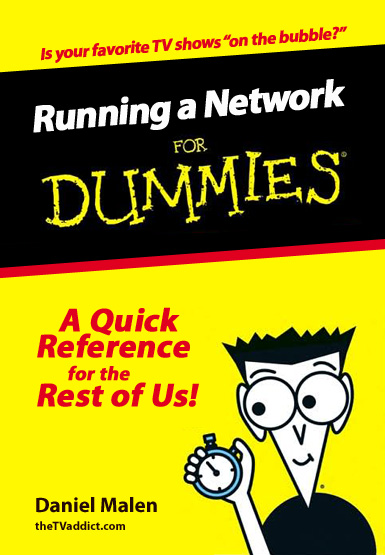
If five years of television blogging has taught us anything, it’s that nothing attracts more attention to a website than alerting a fandom to the fact that their show is on the proverbial “bubble.” So let’s get right to it shall we…
But before we do (We’re sorry, we know good link bait when we see it!), we thought we could at least do you, and by “you” we mean the incredibly passionate fan who lives and dies with this type of thing, the favor of talking to an expert. Which is why we enlisted the help of a highly-placed executive at one of the big four networks to provide a little background on just what factors, aside from ratings, go into deciding whether or not your favorite show is getting cancelled. See for yourself, after the jump.

Despite the rise of ways in which to watch your favorite television shows, the way in which to measure its popularity remains the same. “Ratings are still the primary driver,” explained our highly placed network executive. “But there are several streams to look at.” Most important among the streams is the C3 rating, a new metric founded in 2007 to take into account shows that are watched (or as they say in the biz “sampled”) three days after their initial airing via DVR/PVR. Unlike legal internet viewing alternatives (which according to our source is looked at, but not as a “crucial variable”) the C3 rating, next of course to ratings night of, plays a large role in calculating just how much money the network can charge advertisers.

Thanks to the [shudder] ubiquity of reality television and affordable competition based programming, the cost of any show to a network has never been more important. Regardless of whether the show is produced in-house (see: THE SIMPSONS, which may lose money on FOX but remains a huge cash generator for parent-company Newscorp.) or not (see: HOUSE, which FOX pays NBC Studios a license fee for, while making their money back on ad sales) the fact remains the same: Expensive or aging shows that aren’t pulling their weight (Gulp, BROTHERS & SISTERS, NO ORDINARY FAMILY) are far more likely to be replaced for WHO WANTS TO MARRY THE BIGGEST BACHELOR THAT THINKS HE CAN DANCE versus more affordable fare such as CHUCK and FRINGE.
As we speak, networks are spending in aggregate, hundreds of millions of dollars on an entirely new crop of pilots. How they turn out, coupled with the confidence that the executives that green-lit them have will play a substantial role in whether or not a show is brought back. After-all, there are only so many time slots in a primetime schedule, and often network presidents, particularly newly minted ones (see: ABC’s Paul Lee and NBC’s Richard Greenblatt) are more inclined to bet on their own horses rather than continue to support shows they had no stake professionally in.
Less important, primarily because it’s harder to pin down, is the trajectory, or trend of the show. “We look at the live+7 since that’s a measure of popularity,” explained our source. “For a show like FRINGE the delayed viewing could be a factor in renewal.” Of course, trends can more often than not also factor into a show’s renewal chances negatively. Take CHUCK for example, despite a very passionate and vocal fan base, four seasons worth of 5 to 6 million viewers is a pretty clear indication of just how many people are going to tune in on any given week. And while there’s something to be said for knowing exactly what you’ll get when you air a show, there’s a lot more to be said for a show that promises even an inkling of growth on the horizon. Also factoring in under the trend category is the repeatability factor, “The more serialized a show the less repeatable it is and the less likely it can go out there and grow its audience.”
And finally, logic and hard data can only take you so far. Said our anonymous executive, “Sometimes we renew a show because we all like it.”




